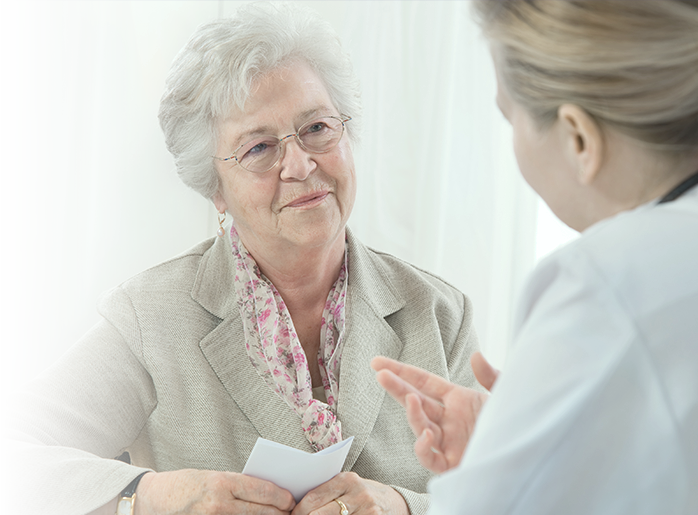Chronic Kidney Disease
Know More: Chronic Kidney Disease
Trustworthy information, straight from the source. Education is the first step in an empowering healthcare plan. Learn more about chronic kidney infections, from prevention to diagnosis and treatment.

Condition Overview
What is chronic kidney disease?
Chronic kidney disease (CKD) is the gradual and permanent loss of kidney function. It is also called chronic kidney failure, or chronic renal insufficiency. Normally, the kidneys remove fluid, chemicals, and waste from your blood. These wastes are turned into urine by your kidneys. CKD may worsen over time and lead to kidney failure.
Risk Prevention
What increases your risk for chronic kidney infections?
- Diabetes or obesity.
- High blood pressure or heart disease.
- Kidney infections or kidney stones.
- Autoimmune diseases, such as lupus.
- An enlarged prostate.
- NSAIDs, illegal drugs, or smoking.
- Family history of kidney disease.
Diagnosis & Treatment Options
What are the signs and symptoms of chronic kidney disease?
Your signs and symptoms will depend on how well your kidneys work. You may not have symptoms, or you may have any of the following:
- Changes in how often you need to urinate.
- Swelling in your arms, legs, or feet.
- Shortness of breath.
- Fatigue or weakness.
- Bad or bitter taste in your mouth.
- Nausea, vomiting, or loss of appetite.
How is a chronic kidney disease diagnosed?
- Blood and urine tests show how well your kidneys are working. They may also help manage or show the cause of CKD.
- An ultrasound, CT scan, or MRI may show the cause of CKD. You may be given contrast liquid to help your kidneys show up better in the pictures. Tell the healthcare provider if you have ever had an allergic reaction to contrast liquid. Do not enter the MRI room with anything metal. Metal can cause serious injury. Tell the healthcare provider if you have any metal in or on your body.
- A biopsy is a procedure to remove a small piece of tissue from your kidney. It is done to find the cause of your CKD.
How is a chronic kidney disease treated?
The goals of treatment are to control your symptoms and prevent your CKD from getting worse. You may need the following:
- Medicines may be given to decrease blood pressure and get rid of extra fluid. You may also receive medicine to manage health conditions that may occur with CKD, such as anemia, diabetes, and heart disease.
- Dialysis is a treatment to remove chemicals and waste from your blood when your kidneys can no longer do this.
- Surgery may be needed to create an arteriovenous fistula (AVF) in your arm or insert a catheter into your abdomen. This is done so you can receive dialysis.
- A kidney transplant may be done if your CKD becomes severe.
Preparing for Care
How can you manage your chronic kidney disease?
- Maintain a healthy weight. Ask your healthcare provider how much you should weigh. Ask him to help you create a weight loss plan if you are overweight.
- Exercise 30 to 60 minutes a day, 4 to 7 times a week, or as directed. Ask about the best exercise plan for you. Regular exercise can help you manage CKD, high blood pressure, and diabetes.
- Follow your healthcare provider’s advice about what to eat and drink. He may tell you to eat food low in sodium (salt), potassium, phosphorus, or protein. You may need to see a dietitian if you need help planning meals. Ask how much liquid to drink each day and which liquids are best for you.
- Limit alcohol. Ask how much alcohol is safe for you to drink. A drink of alcohol is 12 ounces of beer, 5 ounces of wine, or 1½ ounces of liquor.
- Do not smoke. Nicotine and other chemicals in cigarettes and cigars can cause lung and kidney damage. Ask your healthcare provider for information if you currently smoke and need help to quit. E-cigarettes or smokeless tobacco still contain nicotine. Talk to your healthcare provider before you use these products.
- Ask your healthcare provider if you need vaccines. Infections such as pneumonia, influenza, and hepatitis can be more harmful or more likely to occur in a person who has CKD. Vaccines reduce your risk of infection with these viruses.
When should you seek immediate care?
- You are confused and very drowsy.
- You have a seizure.
- You have shortness of breath.
When should you contact your healthcare provider?
- You suddenly gain or lose more weight than your healthcare provider has told you is okay.
You have itchy skin or a rash. - You urinate more or less than you normally do.
- You have blood in your urine.
- You have nausea and repeated vomiting.
- You have fatigue or muscle weakness.
- You have hiccups that will not stop.
- You have questions or concerns about your condition or care.
